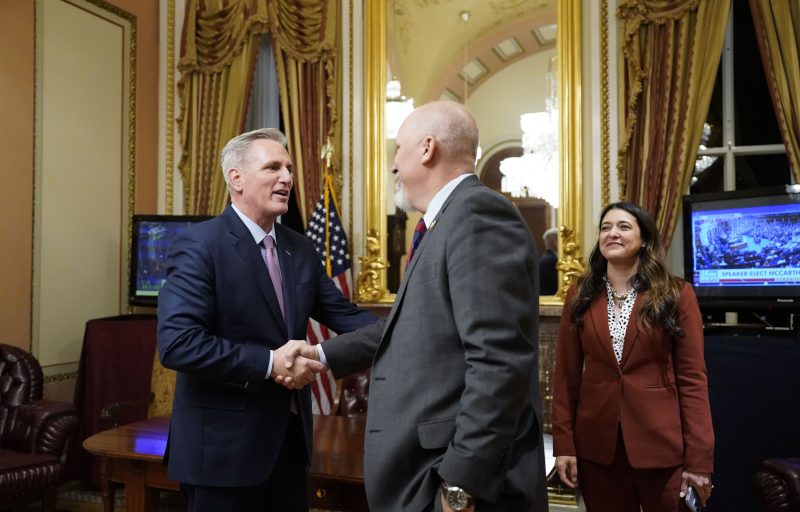We still don’t know precisely what Kevin McCarthy promised the far-right House Freedom Caucus to salvage his bid to become speaker earlier this month, because McCarthy has declined to offer details.
But whatever that deal might have included, it’s become abundantly clear that over the next two years, the caucus will play an outsize role on the most powerful, and likely the most prominent, committees.
We have split control of Washington and a narrow GOP majority in the House; it will be difficult for McCarthy to work with Democrats even if he wanted to. So it’s no secret that the most significant actions the House will take will probably be blocking what Democrats want on matters such as the debt ceiling and conducting investigations.
The new GOP committee assignments have empowered the far right to guide the ship on both fronts. These positions have also given the Freedom Caucus and its allies plenty of power to prevent even more-moderate Republicans from taking hold of the wheel.
While there is no official list of House Freedom Caucus members, they are about one-fifth of the GOP conference of 222 members.
But on the committees that are likely to make news by conducting investigations and oversight of the Biden administration, their share is much larger:
On the House Oversight Committee — the one that led the charge in probing the Obama administration last decade — 38 percent of GOP members are in the Freedom Caucus.On both the House Judiciary Committee and the newly created coronavirus select subcommittee, they are 44 percent of the committee.And on the newly created select subcommittee on the “weaponization of the federal government” — which will investigate alleged abuses of federal authority, including with regard to private sector companies — they account for 50 percent of the committee’s 12 GOP members.
Their hearings are likely to be publicly broadcast over the next two years, and the Freedom Caucus’s representation on these committees is about double what it is in the broader House. And that means these members will be the Republicans that many Americans will be most familiar with.
The Freedom Caucus was overrepresented on both the Judiciary and Oversight committees last Congress, too. (An aide to former speaker Paul D. Ryan recently said Oversight under the Republican from Wisconsin was treated as “a dumping ground for our less serious members.”) But with the GOP gaining the majority and winning more seats on the panels, the committees were restocked with yet more. Added to the Oversight panel were Reps. Marjorie Taylor Greene (R-Ga.), Lauren Boebert (R-Colo.), Paul A. Gosar (R-Ariz.) and Scott Perry (R-Pa.).
And the two newly created panels, whose members McCarthy announced Tuesday, have an even deeper bench of Freedom Caucus members.
Perhaps even more significant is what McCarthy gave away on the Rules Committee — which is effectively in charge of what gets to the House floor. It’s thus generally regarded as the most powerful committee and is almost always stacked with members loyal to the speaker.
But what we see now is a far cry from that.
Just two of the nine GOP members on the committee are in the Freedom Caucus. But both of them — Reps. Ralph Norman (R-S.C.) and Chip Roy (R-Tex.) — initially voted against McCarthy for speaker (which most Freedom Caucus members never did). And that duo doesn’t include Rep. Thomas Massie (R-Ky.), who isn’t in the Freedom Caucus but is generally one of the biggest thorns in the side of GOP leadership.
Indeed, Massie is already talking about forming a bloc with the two Freedom Caucus members. (He insists he’s not there to obstruct legislation, but rather to hold McCarthy to his promises.)
Because the committee has 13 members, it serves McCarthy to have seven votes reliably in his corner. But he has clearly given that sort of majority away.
A bloc that includes Massie could effectively thwart what the other six Republicans want to do, if it combines with the four Democrats on the panel. As it stands, if the three-member bloc votes against McCarthy’s side on an issue, he would have to get at least one Democratic vote to go around it.
And that would be a recipe for a another clash between McCarthy and a hard right that only barely signed off on making him speaker this month. (The Freedom Caucus also secured a concession on the chamber’s rules, allowing just one member to force a vote on removing McCarthy as speaker.)
What are the implications of having these members front and center? The Freedom Caucus’s membership is significantly to the right of the rest of the GOP conference, according to DW-NOMINATE scores, and it included each of the 10 members who were on the far right of the entire House in the 117th Congress.
It is also about 90 percent composed of members who voted against accepting the results of the 2020 election. Some of its members have promoted baseless and false conspiracy theories not just about the election, but about things like QAnon. Democrats and a handful of Republicans removed Greene and Gosar from their committees last Congress after both of them promoted the idea of violence against Democrats.
And in some cases, the conspiracy theories pertain to the very business their committees will deal with. Shortly before being named to the coronavirus select subcommittee, Greene in recent weeks baselessly speculated about Buffalo Bills player Damar Hamlin’s collapse and the death of “Diamond” of Diamond and Silk being somehow vaccine-related. (There is no evidence that political commentator Diamond, whose real name was Lynette Hardaway, was vaccinated.)
Greene celebrated her position on the panel Tuesday by saying she would push for the “truth” about the vaccines. She’ll now have a much bigger platform from which to promote her own distinct version of the “truth” and how to find it — as will many of her more extreme Freedom Caucus contemporaries.

